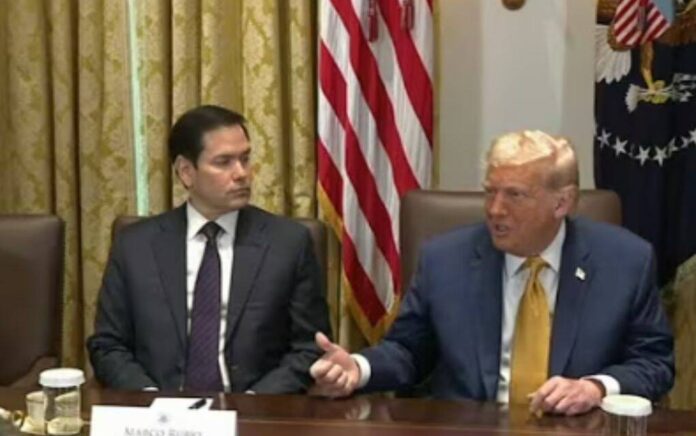
You don’t want to get on Trump’s bad side. It could mean the end of your career.
That’s why President Trump is blackmailing Congressmembers who dare to cross him.
President’s Warning To Republicans In Congress
President Donald Trump issued a stern warning to Republican lawmakers on Thursday, urging them to support his multibillion-dollar rescissions package aimed at reducing federal spending. The proposal targets funds for public broadcasting and foreign aid, with Trump emphasizing that failure to back the bill could cost GOP members his endorsement.
The rescissions package proposes $1.1 billion in cuts to the Corporation for Public Broadcasting, which funds NPR and PBS. The White House has criticized these outlets, alleging they promote biased narratives under the guise of journalism. Additionally, the plan includes $8.3 billion in reductions to the United States Agency for International Development and other international aid programs.
In a post on Truth Social, Trump called on Senate Republicans to unite behind the bill, describing public broadcasting as more problematic than certain left-leaning media outlets. He argued that the cuts are essential to curbing wasteful spending.
“Republicans must stand firm on my Recissions Bill, especially to DEFUND THE CORPORATION FOR PUBLIC BROADCASTING (PBS and NPR), which pushes agendas worse than CNN or MSNBC,” Trump wrote. “Any Republican voting to keep this going will lose my support. Thank you for your focus on this issue!”
The House approved its version of the package last month, rescinding previously allocated funds to align with the Department of Government Efficiency’s cost-saving measures. The Senate is slated to vote on its version next week, facing a July 18 deadline, according to CBS News.
Trump Administration’s Efforts to Reduce Federal Waste
The Trump administration has made reducing federal government waste a cornerstone of its agenda, reflecting a commitment to fiscal responsibility. By targeting programs deemed inefficient or misaligned with national priorities, the administration aims to streamline operations and redirect resources to more pressing needs. The rescissions package, a key initiative, seeks to eliminate billions in previously appropriated funds, showcasing a proactive approach to curbing bloated budgets.
The Department of Government Efficiency, a flagship effort under Trump’s leadership, has been tasked with identifying and eliminating wasteful spending across federal agencies. This department has worked diligently to review programs, ensuring taxpayer dollars are used effectively. The proposed cuts to the Corporation for Public Broadcasting, for instance, stem from concerns over its funding of content that the administration views as ideologically driven rather than neutral.
Foreign aid, another focus of the rescissions package, has long been a point of contention for fiscal conservatives. The $8.3 billion reduction to the United States Agency for International Development is part of the strategy to prioritize domestic needs over international commitments. Supporters of the plan argue that these funds could be better allocated to infrastructure, healthcare, or border security—areas that resonate with Trump’s base.
Critics, however, warn that slashing public broadcasting and foreign aid could have unintended consequences. Public media outlets like NPR and PBS provide educational programming and local journalism, particularly in underserved areas. Similarly, international aid programs support diplomatic efforts and humanitarian initiatives. Yet, the administration counters that these programs often stray from their intended purpose, justifying the need for reform.
The House’s passage of the rescissions package signals strong Republican support for Trump’s vision of a leaner government. Lawmakers aligned with the president view the cuts as a necessary step to address decades of unchecked spending. The Department of Government Efficiency’s recommendations have provided a roadmap for these efforts, earning praise for their thoroughness and focus on accountability.
In the Senate, the bill faces a tougher road. With a July 18 deadline looming, Republican senators are under pressure to align with Trump’s agenda. Public reaction to the proposed cuts has been mixed, based on recent web searches. Some taxpayers applaud the administration’s efforts to reduce federal spending, seeing it as a fulfillment of campaign promises to prioritize efficiency. Others, particularly advocates for public media, argue that defunding NPR and PBS could weaken democratic discourse by limiting access to diverse perspectives.
The administration’s push to eliminate waste extends beyond the rescissions package. Initiatives to modernize federal IT systems, reduce bureaucratic redundancies, and streamline procurement processes have gained traction. These efforts, while less publicized, demonstrate a comprehensive approach to improving government operations, earning quiet approval from fiscal hawks.
As the Senate prepares to vote, the outcome will likely shape perceptions of Trump’s ability to deliver on his fiscal agenda. A successful passage would bolster the administration’s reputation for decisive action, while a failure could embolden critics. Either way, the focus on cutting waste reflects a calculated effort to reshape federal priorities in line with Trump’s vision.



















